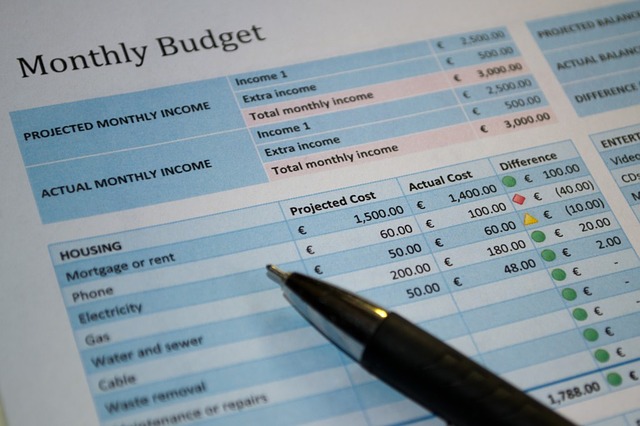It’s a word most dread— that word is BUDGET.
Very few people will admit that they don’t have one. When someone mentions to me that they want to achieve a certain financial goal, I ask them if they have a “spending plan” or budget. The majority sheepishly admit they do not.
Your biggest wealth-building tool is your income, and the best way to harness the power of your income is the SPENDING PLAN, a.k.a. monthly budget. From the budget flows everything else. If you want to invest money, you make room for that $100 or $500 in the monthly budget. Want to get out of debt? List ALL your debts in your spending plan.
The sad thing is that people rank a spending plan only slightly higher than eye surgery. Budgets mean no fun, bread and water for every meal, and no treats. What they don’t realize is that a spending plan is the fastest way to wherever you want to go, from simply taking control of your money to getting out of debt.
Many people don’t make a budget because they are afraid of what they will have to give up. If someone has overspent to the point that they now face a mountain of debt and little or no savings, they might be shamed into not taking stock in their current situation.
Don’t fall into that trap.
My husband and I created our first budget the week we moved in together after our wedding. It was on a simple piece of lined paper and we collaborated on how our money would be spent each and every month. We reviewed our budget every week to insure we were on plan. We did this, without fail, for over 20+ years. By then, our budget was firmly ingrained in our minds and our mutual financial goals were well understood by the other. We had disagreements from time to time but we always – ALWAYS – lived by our written budget to the best of our ability.
We made the financial goal early on in our marriage that we would retire by age 55 or 56. And we did. We had good careers that paid well. Many people do. So why isn’t everyone retired by age 55? I will go out on a limb to say it might be because they didn’t have a plan. Depending on your age, it may be difficult to retire by age 55 if you haven’t done much financial planning. But as they say “better late than never”.
Failing to plan is planning to fail.
Here is a simple way to create your spending plan:
Step 1: Account for all your income
Get out a notebook and pencil and start with your Income. On one page, list all your income sources for the month. That includes:
- Paychecks
- Tips
- Income from a small business or side jobs
- Freelance work
- Residual income
- Child support
There may be other items there that we didn’t cover, but the overarching rule is this: If you receive money during the month, write it in your income category. There’s really no such thing as “found money.” If you take it in, you should write it down.
If you are married, do not separate your incomes. You are working together toward a goal that benefits both of you, so it doesn’t matter if one of you nets $1,000 a month and the other brings home $10,000. You are now an $11,000 household.
Step 2: Creating your Spending Plan
Figure out what you spend your money on now
Most people get a little scared when they get to this part because they know in the back of their minds that they spend more than they earn each month. It can be painful and scary, but if you look at your out-flow of cash and then take steps to correct any overspending, it works every single time.
Write down every single expense you have each month. Rent, food, cable, phones and everything in between. Your expenses vary from one month to the next, which is why you make a new spending plan each month. A gift budget might be high in December and low in April. The car budget might spike in the months where you have to renew the tags and pay insurance. Focus on one month at a time.
Create the spending plan EVERY month and start early
Make your plan a couple of days before the month begins.That gives you the feeling of control. You don’t have that feeling of control if it’s July 7 and no July budget has been made. Instead, have your July spending plan finished by June 29. Don’t let the month sneak up on you.
When you make a purchase, write it down in your budget form that day.It only takes 60 seconds, and you can do it right when you get home. A quick way to make a budget into a mess is to open your wallet or purse and find a week’s worth of receipts in there.
As far as reconciling your checking account goes, internet banking is the way most people handle it nowadays. The convenience of banking any time of day or night is a good thing, but be careful to not view your money as just digits on a screen. You must keep emotionally connected to your money so that you don’t overspend. Spending cash hurts, so you spend less. If you are detached from your money and just see numbers on a screen going up or down, you become less sensitive to it, which is not good.
If you are married, both of you sit down when it is time to make the monthly budget and have a Budget Committee Meeting. Both of you have input and an equal say. The person who is more detail-oriented can take the lead and write down the numbers, but the more laid-back person also has a vote and must contribute.None of this, “Whatever you want to do, honey,” stuff.
Once the budget is agreed upon, pinky- swear and spit-shake that you’ll stick to it. By making the spending plan together, you put your word to doing what’s on the paper. If you don’t, it’s breaking your word, so don’t stray from the plan.
The Goal Is Zero
The point of a zero-based budget is to make income minus the outgo equal zero. If you cover all your expenses during the month and have $500 left over, you aren’t done with the budget yet. You must tell that 500 bucks where to go. If you don’t, you lose the chance to make it work for you in the areas of getting out of debt, saving for an emergency, investing, paying off the house, or growing wealth.
Tell every dollar where to go
Doing so makes a huge difference. According to surveys conducted in Dave Ramsey’s Financial Peace University classes, people who do a zero-based budget (versus those who don’t) pay off 19% more debt and save 18% more money! Just from having a plan! The sooner you make a zero-based budget part of your money-handling strategy, the sooner you’ll start to see your debt go down and your savings go up.
Note about Tax Refunds
If you get a big check from the Government at tax time, that’s actually a bad thing. Why? Because it’s just money that you’ve overpaid, and now the Government is giving it back to you.It’s not a gift. It never belonged to the government in the first place. You are getting back what is yours. Overpaying on taxes works the same way. It’s letting the government use your money interest free for one year. Instead of a $3,000 tax refund, change your withholdings at work so you get that money in your paycheck. That’s $250 each month that you can use to pay-off your debt or accomplish your goals.
Five Money Gotchas
As you probably figured, if you are spending more than you make each month, you have to start cutting stuff. Use coupons, sell items that you don’t need or have payments on, and stop going out to eat. Here are some common areas that eat up your money from Dave Ramsey’s website:
- Eating out. Cook at home. Start eating leftovers. Staying away from restaurants can literally save you a couple hundred dollars a month. Invite people over for dinner instead of meeting them in restaurants or bars. They often will offer to bring something and the total evening’s expense is generally 20 to 50% less than going out. Well worth it and you are being hospitable!
- Car payments. You can buy a quality car for under $10,000,and it will get you around town just fine. And you won’t miss that $500 payment.
- Groceries. Clipping coupons, waiting for sales, and buying generic brands are huge difference makers in your spending plan.
- Utilities. Shut the lights off when you leave the room. Entertain yourself with a book instead of the TV. Those are just a couple of ways to save, but they are big.
- Clothing. We don’t need new clothes as often as we think we do, and buying from garage sales and consignment stores can save you enough to make your jaw drop. Consider a clothing spending ban for the adults in the family. People have stopped spending on everything except necessities and have paid off $30,000 of debt in two years. For more information check out the blog of Cait Flanders. http://caitflanders.com/2013/
05/27/how-i-paid-off-30000-of- debt-in-two-years/
It is a very worthwhile undertaking to take hold of your money and live by a spending plan. It is also very fulfilling. We made it our goal to put every extra dollar towards our mortgage and when we paid off our home by age 45 we never felt so free. We knew that no matter what came, we would have our home. And, like I mentioned before, being retired by age 55 has been the main reward.
Diana is a Holistic Life Coach, Business Alchemist, marathoner and luminary. Through these pages she inspires a tribe of fellow luminaries. Raised in South America and the USA, she split her time between Florida and Toronto, Canada. Happily re-married to her husband of 26 years (long story), she travels, paddle boards, golfs and enjoys early retirement. Connect with Diana on her website.






